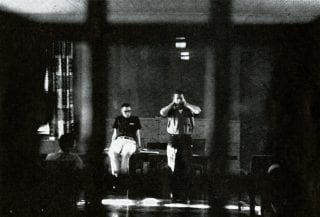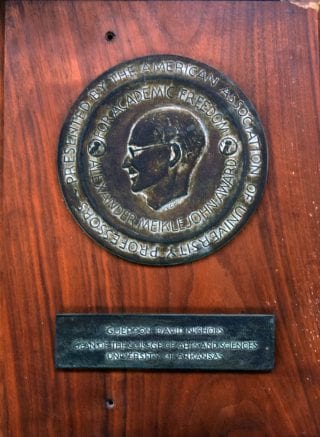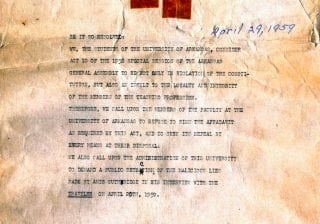Sixty years ago, the state of Arkansas became embroiled in a tense political, social, and legal battle as a result of school integration attempts. On August 26, 1958, a special session of the Arkansas General Assembly passed a slew of legislation in response to attempts to desegregate Arkansas public schools. Among the sixteen bills was Act 10 which required state paid educators to make public their affiliations with political groups for the previous five years. The purported goals were to expose subversives such as communists and communist sympathizers, but another reason for this was to reveal state employees who were members of the National Association for the Advancement of Colored People (NAACP). Another act, Act 115, was passed in the same special session which outlawed state employees from being NAACP members.
A petition signed by over 1,000 students supporting the faculty.
The act was resisted by Little Rock teachers, notably B. T. Shelton and J. O. Powell, and several members of the University of Arkansas faculty and administration, including Max Carr and Guerdon Nichols. Shelton, Powell, and Carr would be the plaintiffs in ensuing court challenges of the act with support from the NAACP and the American Association of University Professors (AAUP), a nonprofit group dedicated to academic freedom. Many faculty members filed affidavits with vocal protest, others stepped down instead of signing, while a handful (including Carr) refused to sign and were fired as a result. A rally was held by the student body on April 29, 1959 where over a thousand students signed a petition supporting the faculty in their resistance to the act.
Photo taken through a closed door of students debating a strike to protest the act.
Guerdon Nichols, then dean of the College of Arts and Sciences, was vocal in his criticism and resistance to the act. In 1960, he received the Alexander Meiklejohn Award from the AAUP for “a consistent record of clarifying the meaning of academic freedom and of promoting the conditions of that freedom.” Also in 1960, the United States Supreme Court heard Shelton v. Tucker and ultimately decided in a five-to-four majority that Act 10 was unconstitutional due to violation of the due process clause of the Fourteenth Amendment.
The Alexander Meiklejohn Award received by Nichols.
The University of Arkansas Special Collections has many resources for researching this and related topics. The department recently opened the Guerdon Nichols Papers Addendum (MC 1370a) for research which contains the Alexander Meiklejohn Award that Nichols received from the AAUP. Other collections include: Act 10 Petition (MC 611), E. Philip Trapp Collection (MC 1038), Guerdon David Nichols Papers (MC 1370), and the Arkansas Council on Human Relations Office Records (MC AR4 ACHR).
The text of the student petition (altered for readability).
Transcript: Be it so resolved, We, the students of the University of Arkansas, consider Act 10 of the 1958 special session of the Arkansas General Assembly to be not only in violation of the constitution, but also an insult to the loyalty and integrity of the members of the teaching profession. Therefore, we call upon the members of the faculty at the University of Arkansas to refuse to sign the affidavit as required by this act, and to see its repeal by every means at their disposal. We also call upon the administration of this university to demand a public retraction of the malicious lies made by Amis Guthridge in his interview with the Traveler on April 28th, 1959.




